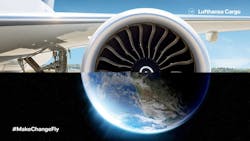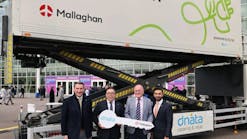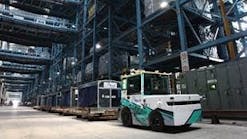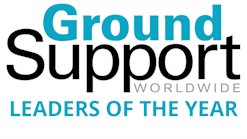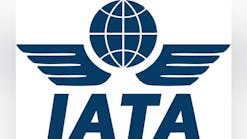Lufthansa Cargo on the Way to CO₂ Neutrality by 2050
With the goal of achieving CO₂ neutrality by 2050, Lufthansa Cargo is on track to help lead the aviation and cargo industry into a more sustainable future. To this end, as part of the Lufthansa Group, it relies on a measurable corporate commitment to sustainability on the basis of science-based targets for the reduction targets of greenhouse gas emissions. At the Sustainability Conference at Frankfurt Airport, Lufthansa Cargo presented its Sustainability Update 2022, which provides an overview of measures and projects already implemented on the way to CO₂ neutrality.
Lufthansa Cargo will derive its own emissions target from the Lufthansa Group's validated science-based targets.
The Lufthansa Group – and thus also Lufthansa Cargo – have set ambitious climate protection targets: The goal is to halve net CO₂ emissions by 2030 compared to 2019 and to achieve a neutral CO₂ balance by 2050. In order to further specify these net targets and to expand the target system to include pure reduction targets, it has already joined the "Science-Based Target Initiative" (SBTi) in 2021 in order to bring its CO₂ reduction path into line with the United Nations' Paris Climate Agreement. Based on scientific calculations, CO₂ emissions are continuously reduced with the help of fleet renewal and optimization, improved operational efficiency, and the use of sustainable aviation fuels. The official validation of these targets is imminent. For freighters, there will be a special sub-target.
The Science-Based Targets Initiative only accepts emission reductions that are the result of fuel consumption reductions, for example through modern new aircraft, operational and airspace infrastructure measures, and the substitution of fossil fuel with sustainable aviation fuel.
Dorothea von Boxberg, chairperson of the executive board and CEO of Lufthansa Cargo, said, "Over the past 25 years, we have already been able to reduce our CO₂ footprint per ton kilometer by 52%. But that is still not enough. That is why we want to set ourselves ambitious targets for the future. With the 'Science-Based Targets Initiative,' we have found a credible, scientific basis for this. We want to be transparent about what we have achieved so far and just as open with our customers, partners and the public about how we can get even better."
For Lufthansa Cargo, the efforts to achieve complete CO₂ neutrality focus primarily on five fields of action: continuous fleet modernization, more efficient use of fuels, the switch to more sustainable aviation fuels (SAF), CO₂ compensation projects in other sectors, and reduction of emissions on the ground.
Fleet Modernization
Lufthansa Cargo is investing heavily in continuous fleet modernization. As a result, CO₂ emissions have already been reduced by 52% over the past 25 years. Since October 2021, Lufthansa Cargo has completely converted its fleet to Boeing 777F freighters –currently the most modern and efficient freighter with the best environmental balance. By 2030, Lufthansa Cargo will also receive up to 10 additional Boeing freighters, including seven 777-8F freighters, Boeing's next-generation freighter. The Boeing 777-8F freighters will again significantly reduce CO₂ emissions.
Fuel Efficiency
To ensure that conventional aviation fuel is used as efficiently as possible, thereby reducing the total amount required, Lufthansa Cargo is relying on various measures. For example, Lufthansa Cargo will successively equip all freighters with Sharkskin technology from 2022. The innovative AeroSHARK coating, which is modeled on a sharkskin, reduces the aircraft's frictional resistance in the air by more than 1% and thus reduces fuel consumption. In the Lufthansa Cargo fleet, this can save around 3,700 tons of kerosene or almost 13,000 tons of CO₂ emissions annually. In addition, lightweight containers have been used exclusively in flight operations since 2020. This will result in a weight reduction of 14 kg per container and fuel savings of 2,160 tons per year. Weight reduction is also being pursued for other loading aids. Fuel is also saved thanks to optimized flight procedures.
Sustainable Aviation Fuels
Lufthansa Cargo is one of the pioneers in the use of SAF in the airfreight industry. More than 1% of Lufthansa Cargo's fuel requirements in 2021 have already been covered by sustainable aviation fuels. The airfreight company also currently offers the only regular full-charter cargo connection worldwide that is 100% covered by SAF. This saves around 174 tons of conventional kerosene each week. Since October 2021, Lufthansa Cargo has also been one of the first customers of the world's first power-to-liquid fuel plant in Emsland, Lower Saxony. Together with one of its customers, Lufthansa Cargo has committed to purchasing at least 20 tons (=25,000 liters) of the synthetic, CO₂ neutral crude oil annually over the next five years in order to further advance the innovative power-to-liquid technology as well as the use and further development of sustainable aviation fuels.
Lufthansa Cargo presented the measures it has taken and the successes it has achieved so far at its Sustainability Conference at Frankfurt Airport on Thursday, July 14. Keynote speakers included Dorothea von Boxberg (CEO of Lufthansa Cargo), Dr. Sabine Mauderer (Member of the Executive Board of Deutsche Bundesbank), Marc Buckley (Environmentalist, Ecological Economist, UN Advocate and Advisor) and Matthias Kopp (Director Sustainable Finance, WWF Germany). Together with numerous customers, current issues around the topic of sustainability were also discussed. Lufthansa Cargo will regularly supplement its update on sustainability and report on the interim goals achieved. As soon as the concrete science-based targets for the Lufthansa Group have been validated, the designated targets for cargo aircraft contained in them will also be made available to the public.
